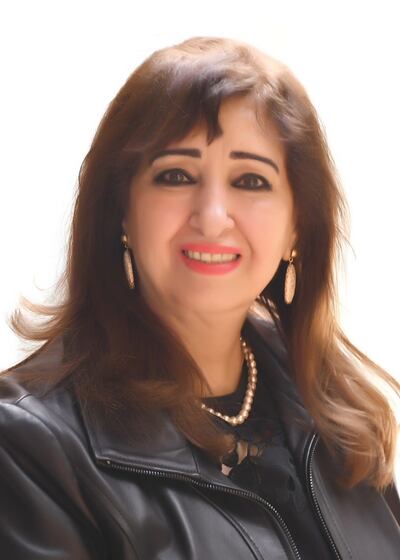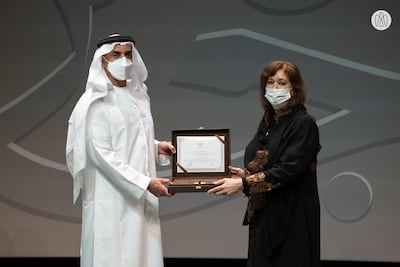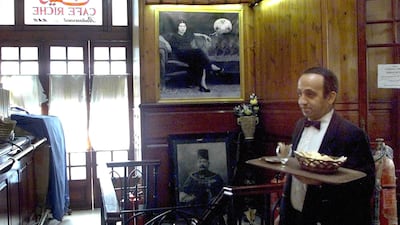The first time Maisoon Saqer sat down in Cairo's Cafe Riche, she was in the eye of the storm.
It was the summer of 2012 and the city convulsed with protests as part of Egypt’s roiling political crisis.
She recalls the heady experience as laying the seeds for her biggest literary triumph.
"I sat in a position where I could see the main door looking out on the main street, which was filled with protesters," she says during a session at the Frankfurt Book Fair, which ends on Sunday.
"Out of the corner of my eye, I could also see a secret passageway in the cafe leading to the street on the other side.
“I could see militants and protestors involved in the protests using that space to make an escape.
“It made me realise how sometimes you can only see what is in front of you, while in the background, there are also important things going on. This is really what I've been trying to look for within my work.”

It has been a creatively arduous search for Saqer, who sporadically found that depth in various fields such as poetry, visual arts and film.
However, it was last year that she achieved the impact she craved, with the publication of Eye on Egypt: Cafe Riche.
It is a kaleidoscopic and vibrant account of a once-discreet venue now regarded as a historic centre of Arabic literature.
The work earned Saqer this year's Sheikh Zayed Book Award in the literature category and, as a result, discussion on the book's foreign translation rights are already under way at Frankfurt Book Fair.
A book of memories
Appearing in her session via video link from her Cairo home, the Sharjah-born author says it was during subsequent visits to Cafe Riche that the novel’s ambitious concept took shape.
"In the cafe, you will see these documents and pictures that serve as memories of Egyptian history and politics," she says.
"Looking through these, I realise the book is not only about an important coffee shop.
“I didn’t want to do that because those that did in the past did it in order to beautify the place.
"Instead, I wanted to write about the history of Egypt through the small eye of the cafe.”
After a passionate introduction describing the significance of the place — from being a favoured meeting and writing spot for intellectuals and authors such as Naguib Mahfouz to being a location cited by historians where future president Gamal Abdel Nasser planned his overthrow of King Farouk in 1952 — Eye on Egypt: Cafe Riche delves into a wider discussion of Cairo’s varied geography and historical demographics.
The 654-page work then picks up steam and focuses on Cairo’s coffee culture and how venues such as Cafe Riche, founded in 1908 and named after Paris's Grand Cafe Riche, was a home for the intelligentsia, as well as cultural and political renegades.
Some of the winning anecdotes include a small performance by a promising singer called Umm Kulthum, aged 22, in 1920 and the discovery of a secret room with an old printer — believed to have been used during the 1919 revolution — in the aftermath of the devastating 1992 Cairo earthquake.
Saqer weaves them all together with a light and, at times, playful touch.
"And that's because what I am essentially doing is writing about memory and not a book purely about politics and history," she says.
"Using that approach, I found the doors opening to me, so to speak. I write about the cafe and I can see Naguib Mahfouz sitting there. I can hear Umm Kulthum performing on the small stage. I can see paintings by great Arab artists hanging on the walls.”
Saqer also gives us a glimpse into some of the famous Egyptian literary romances kindled within the intimate confines of the cafe during in the 1960s, including the eventual marriages of poet Amal Dunqul and journalist Abla Elrowainy, as well as poet Ahmed Fouad Negm and literary critic and novelist Safinaz Kazem.
“Their relationships mixed literature with the personal and that, for me, is the most beautiful thing about the Cafe Riche,” Saqer states.
UAE as a cultural capital

More than the Dh750,000 cash prize, the Sheikh Zayed Book Award gave the work and its subject international renown.
Saqer's book fair appearance on Friday was augmented by a panel conversation with Samir Grees, an Egyptian translator, and Sonja Hegasy, deputy director of Leibniz-Zentrum Moderner Orient, a German research institute focused on the Middle East.
Saqer hails the fact a book about Cairo, written by an Emirati and discussed in the world’s biggest publishing event in Frankfurt is a sign of the UAE’s prominence as an important cultural hub.
“Culture is not only about books, but also discussion, forums and continuous activities in general,” she says.
“UAE has a great history of doing that and the importance they give to the Sheikh Zayed [Book] Award, which represents the whole Arab world, shows how much they care about culture.
“Ultimately, it’s not about being in competition with other cultural capitals, but about showing how culture is always essential.”


